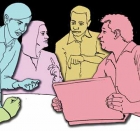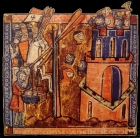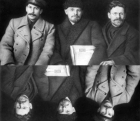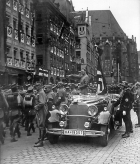Extended Reading
Using written sources to answer historical questions involves far more than literal comprehension, but learning to draw valid inferences and to interpret sources in their historical context obviously depends on students’ capacity actually to read and engage with different kinds of written material. The resources in this section illustrate the range of approaches that teachers have used successfully to capture students’ interest in texts, giving them incentives to read and techniques to help make sense of what they are reading by processing and responding to it in various ways. The articles and plans presented here also demonstrate the value of explicit teaching about reading strategies, helping students to recognise the difference between skimming and scanning, for example, so that they can work out what to do when. Read more
-

'I feel if I say this in my essay it’s not going to be as strong’
ArticleClick to view -

A most horrid malicious bloody flame: using Samuel Pepys to improve Year 8 boys' historical writing
ArticleClick to view -

Conceptual awareness through categorising: using ICT to get Year 13 reading
ArticleClick to view -

Debates: Narratives - what matters most in school history education?
ArticleClick to view -

Designing an enquiry in a challenging setting
ArticleClick to view -

Developing sixth-form students' thinking about historical interpretation
ArticleClick to view -

Dickens...Hardy...Jarvis?! A novel take on the Industrial Revolution
ArticleClick to view -

Do we have to read all of this?' Encouraging students to read for understanding
ArticleClick to view -

Exploring the challenges involved in reading and writing historical narrative
ArticleClick to view -

Film: What's the wisdom on... Extended Reading
ArticleClick to view -

Getting medieval (and global) at Key Stage 3
ArticleClick to view -

Historical scholarship and feedback
ArticleClick to view -

Historiography from below: how undergraduates remember learning history at school
ArticleClick to view -

It’s just reading, right? Exploring how Year 12 students approach sources
ArticleClick to view -

Learning to read, reading to learn: strategies to move students from 'keen to learn' to 'keen to read'
ArticleClick to view -

Little Jack Horner and polite revolutionaries: putting the story back into history
ArticleClick to view -

Meeting the historian through the text
ArticleClick to view -

Move Me On 162: Reading
ArticleClick to view -

Nazi perpetrators in Holocaust education
ArticleClick to view -

Passive receivers or constructive readers?
ArticleClick to view

